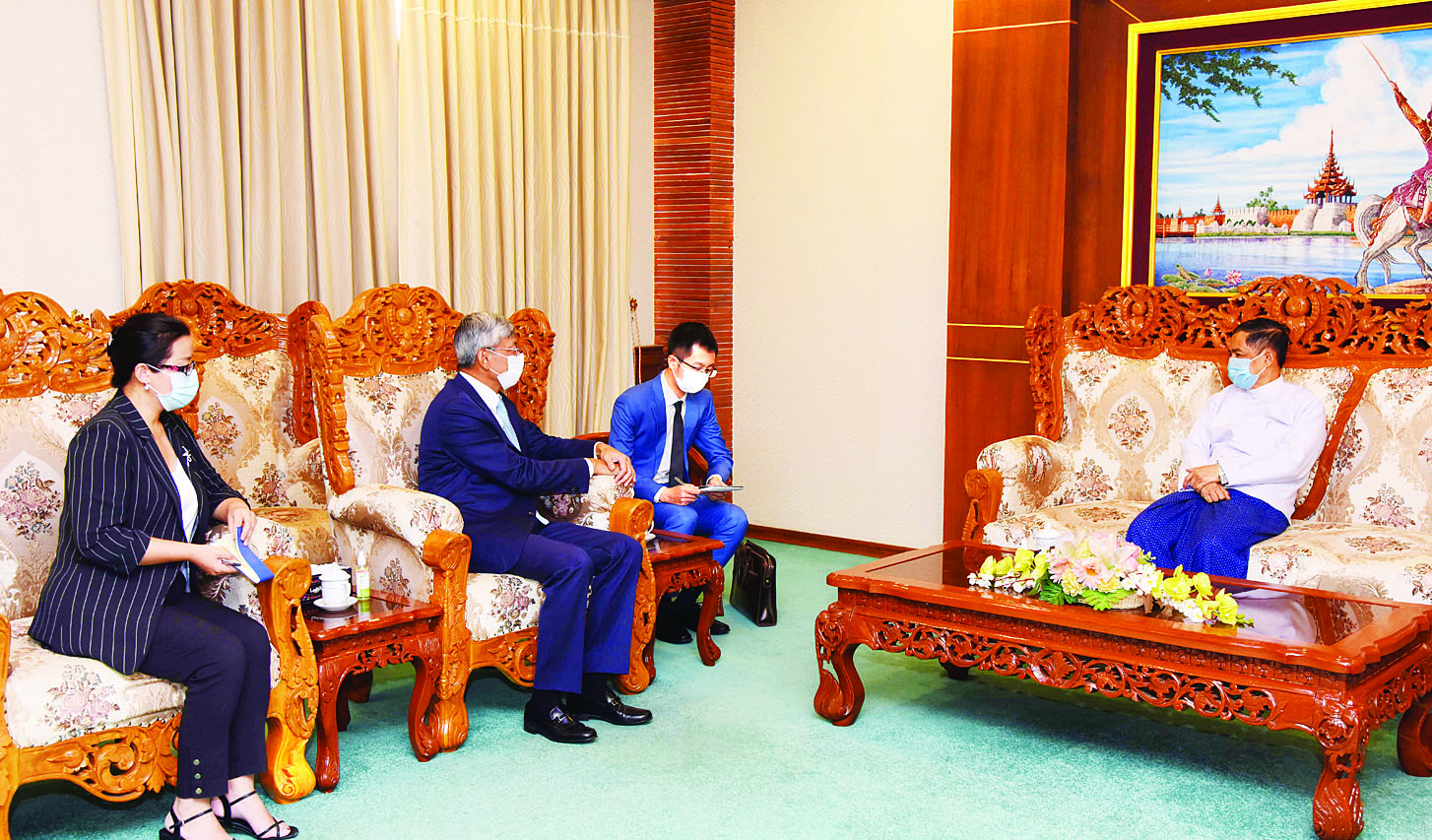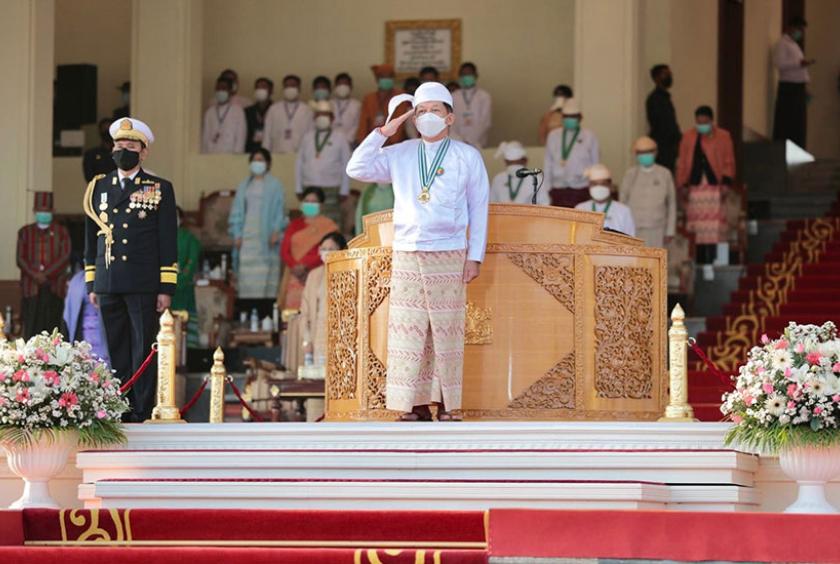Junta Watch
Junta chief Min Aung Hlaing attends the grand military review to mark Union Day on Feb. 12, 2022.
Diplomatic rush hour in Naypyitaw

On the heels of diplomats and officials from Russia, Japan and India who have lately busied themselves in Myanmar’s administrative capital Naypyitaw, Chinese Ambassador to Myanmar Chen Hai has also rushed to promote Chinese interests in military-ruled Myanmar.
On Nov. 25, he met junta-appointed International Cooperation Minister U Ko Ko Hlaing and called for accelerating implementation of China-backed projects in Myanmar, and promised to cooperate more closely in the international arena, in particular with the United Nations and regional bloc the Association of Southeast Asian Nations.
Chen also met minister of the junta’s Union Government and junta peace negotiation team leader Lieutenant-General Yar Pyae, and donated cash on behalf of the Chinese government for Myanmar’s peace process and the socioeconomic development of ethnic people in border areas.
Though Beijing does not directly engage with junta boss Min Aung Hlaing, it has provided diplomatic support for the Myanmar regime on the international stage while continuing to invest in the country.
Earlier this week, political consul Lin Tao from the Chinese Embassy paid a call on the chairman of the military’s proxy Union Solidarity and Development Party, U Khin Yi, in Naypyitaw. Also, diplomat Zheng Zhihong from the embassy opened a disaster awareness center and disaster response equipment warehouse in Shan State’s Pindaya. The center was established with Lancang-Mekong Cooperation special funds. Meanwhile, Mandalay-based Consul General Chen Chen donated a LED screen board at a pavilion named after China’s first premier Zhou Enlai at the Shwezigon Temple in Bagan. The pavilion was built with donations made by Zhou during his visit to Bagan in 1961.
More power cuts ahead

After serious power outages nationwide late last year and early this year, the Myanmar military regime said the electricity supply would be restored to normal by May, but as December begins, blackouts are still frequent and widespread across the country including in the commercial capital Yangon and major cities like Mandalay, with many places only enjoying a few hours of electricity per day.
Junta-appointed Electricity Minister U Thaung Han said on Nov. 25 that power supply would be reduced in the coming hot season. A few days later, junta chief Min Aung Hlaing urged people to save energy.
This suggests Myanmar people will have to suffer through power cuts for at least six months until the monsoon begins, as hydropower is the main source of electricity in Myanmar. The whole country endured long hours of blackouts every day in the last hot season.
Min Aung Hlaing is pushing solar energy production, and the regime is also cooperating with Russia’s state-owned nuclear energy firm Rosatom to establish nuclear power plants in Myanmar. But even if those projects take shape as planned, it will take some time for them to bear fruit.
For now, to justify the power outages, the regime has tried to shift the blame onto People’s Defense Force groups, accusing the resistance organizations of destroying power infrastructure.
Preparations under way for Independence Day bash

Junta officials have been busy organizing an event for their boss Min Aung Hlaing to celebrate Myanmar’s 75th annual Independence Day, which falls on Jan. 4, 2023.
Min Aung Hlaing squandered billions of kyats when his regime celebrated the 75th Union Day in February this year, and he is planning even grander celebrations for next year’s Independence Day. The junta’s ministers, deputy ministers, chief ministers of regions and states and many military officials are involved in organizing related events.
The armed forces’ military equipment office has been stockpiling fireworks, and the engineering office is finalizing plans for 600 drones to fly in 3D formations for 13 minutes when Min Aung Hlaing hosts a dinner for guests on the eve of Independence Day.
The deputy defense minister is tasked with ensuring that all the places Min Aung Hlaing goes during the celebrations are free of land mines, while the health minister is assigned to shield guests from mosquito bites, and keep the 1,000-bed Napyitaw Hospital ready should Min Aung Hlaing or any of his guests suffer health problems.
The event will see Min Aung Hlaing again squandering billions of kyats even as he preaches the merits of thriftiness to his ministers, military personnel and the Myanmar people. The planned celebrations also offer opportunities for organizing committees at different levels to line their own pockets. Min Aung Hlaing is aware of this, and has urged them to return unspent funds without delay.
Min Aung Hlaing hopes to hold election as planned

As Min Aung Hlaing addressed the graduation ceremony for the 64th intake of the Defense Services Academy on Friday, he repeated his call for a general election, which his regime aims to hold in August next year. The election must be held across the country and ethnic people and people representing different strata of life must be able to stand in it, the junta chief stressed.
It is however impossible to hold voting across the country considering the ongoing fighting in central Myanmar and ethnic areas.
In an interview with Russia’s state-owned news agency RIA, Min Aung Hlaing said the possibility of an election being held largely depends on the stability of the country.
The regime has been urging ethnic armed organizations to commit to participating in the election, and has invited tenders for polling station materials. It is also in the process of choosing venues for polling stations. It said it would replace the current first-past-the-post electoral system with proportional representation.
Under the army-drafted 2008 Constitution, the military chief can extend a state of emergency twice, for six months each time, after the initial one-year emergency declaration expires. As the regime has also renewed it twice, the state of emergency will expire on Feb. 1 next year, and the military has to hold the election within six months of that date, according to the 2008 Constitution.
It remains to be seen what trick the regime will play in order to hold the election as its plans. Foreign governments including those of the US and Malaysia, as well as political parties and ethnic armed organizations including the Karen National Union, have voiced objection to the election proposed by the junta.


